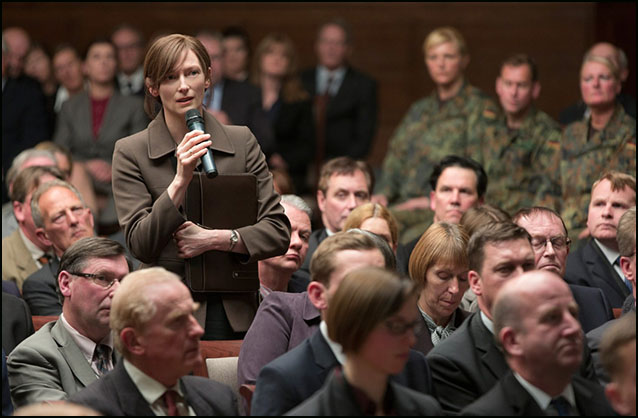War Machine
We
watched a Netflix movie, War Machine, with Brad Pitt. It is meant to be a
satirical movie, one probably could call it an anti-war movie. It is the story
of an American general, totally out of his depth in Afghanistan.
A seminal
scene in the movie has the general assure an audience of European military
personnel and officials that America is in Afghanistan to bring freedom and
prosperity. A German politician (played by Tilda Swinton) gets up and delivers a
monologue of restrained power.
She makes the point that what she sees in front
of her is a righteous, well-intentioned man, who nevertheless - while he is
ambitious - also is ignorant enough to believe unquestioningly the preposterous propaganda he
is promulgating.

Furthermore, she sees before her a man who is beholden to his ego and
whose career goal is to win, regardless of what that means for the people of
Afghanistan; who, incidentally, don’t want him - or the American armed forces -
in their country.
While I cannot recommend the movie (neither can The
Guardian’s critic), I found the politician’s interchange with the general
telling: Well written and acted, a sobering display of the disconnect between
what the War Machine is fighting to achieve and what the country needs for
its people. I am struck by the parallels to reality … in Afghanistan as well
as in Iraq and Syria War Machines are tearing the countries apart. The people
are suffering. What is achieved? Destruction. Death. Not much more, at least
nothing that will advance the prospect for peace.
Typical is a (feeble)
fighting scene toward the end of the movie: A few grenades are fired at a
position held by the enemy … when a soldier checks the result, he realizes all
that’s achieved is the death of a child. This is the story of the wars that are
currently fought with the goal of defeating ISIS and terrorism.
The War On
Terror is costly in the extreme and all the while it seems obvious that it is
politicians’ and generals’ egos that are driving the war … as well as the providers
of weaponry and supplies.
Another term for War Machine is the
Military-Industrial Complex (see WEAPONRY). In his book War is a Racket, S. D. Butler
describes its workings: “War is a racket. It always has been. It is possibly
the oldest, easily the most profitable, surely the most vicious. It is the only one
international in scope. It is the only one in which the profits are reckoned in
dollars, and the losses in lives.”
Often the war efforts have gone
so far, it is impossible to pull out. Yet, while it is acknowledged that the
conflicts cannot be won militarily, the world’s leaders can’t look beyond the
perceived need to secure an immediate military advantage in order to bolster
their positions at the negotiating table … hence War Machines are deemed the most
sure-fire means to deal with the world’s crises.
But at the same time the
reasons why we have gotten ourselves into these wars are ignored. What would it
be like to look beyond the need to feed the War Machines? At the root of the War
on Terror are the causes of terrorism … why do radical Islamists wish to destroy
the West?
One reason is obvious: In 1948 it was decided to create the state of Israel in
Palestine. Palestinians were shoved into camps and their right for their own
homeland has been denied. World peace will be elusive until world leaders come
together and resolve the injustices that motivate suicide bombers (see blog 812).
I'm a pacifist from way back, my book en.light.en.ment is full of essays on ...
WAR
PACIFISTS
PACIFISM 1, 2, 3
WAR & PEACE CONSCIOUSNESS
WEAPONRY
FIGHTING FOR PEACE
Furthermore, I have a PACIFIST MANIFESTO